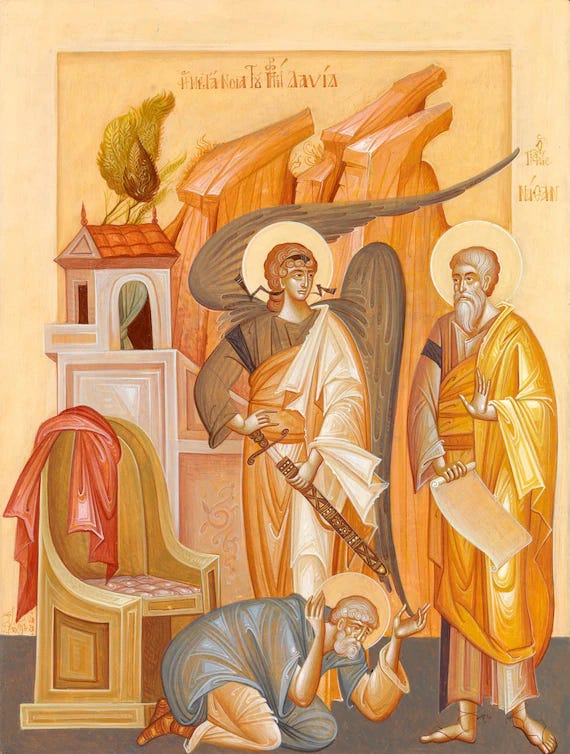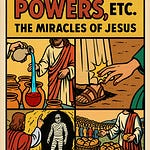A Homily for Ash Wednesday — Psalm 51 and Romans 7.19-25
A church member in a former congregation, Roger, was a sharp, successful small-town lawyer whose alcoholism and philandering had destroyed his first two marriages and, by the time I became his pastor, was destroying him. I went to visit him in the hospital as he died slowly of liver failure. With each visit his skin and eyes had assumed a more yellowed hue.
After my final visit, when his breathing had gotten shallow and his words confused, I knew I should stop at his best friend’s house on the way back to the parsonage. I knocked on the screen door on Billy’s back porch. I could hear an Orioles game playing on the TV in the family room. Billy and his live-in girlfriend had had me over for dinner many times so I wasn’t surprised when he answered the door wearing a polo shirt that probably fit him in the Carter administration and, below the waist, even tighter bikini briefs.
“Billy, I’ve just come from seeing Roger. It’s time.”
“You sure?”
He squeezed his eyes to fight back the tears and he laid bear paw grip on my shoulder to steady himself. “You never know for sure,” I said, “but I prayed and offered him the absolution. So yeah, it’s time. He’s dying.” And suddenly he gathered himself and ran to get pants that were draped over the kitchen island stool.
“If he’s going to be dead soon, then we’ve got to get to his office quick.”
“His office?” I asked, confused, “Why in the world do we need to go to his office?”
“You’ll see,” he said, “We’ll be back in a jiffy, honey,” he hollered at his girlfriend Mary.
Once we got to Roger’s law office, Billy produced a key from the pocket of his pants, which also appeared designed for a fraction of this man. Inside, Billy dragged a heavy leather chair across the office floor. He stood up on it, reached up towards the ceiling, removed a water-stained tile, felt around on all sides until he found it and then pulled down a cardboard banker’s box and handed it to me.
“Look, Billy, I don’t know that we should be doing this.”
“Shut up and take the damn box,” he said, “before I drop it.”
I looked inside the box and I suddenly both understood and yet still didn’t understand what we were doing there. Inside the box, along with a half-dozen liquor bottles, were photographs of Roger with women. The kinds of Polaroids I can’t describe in church. None of the women in them, I noticed, were his present wife.
“Prostitutes mostly,” Billy said, “His wife thought different but Roger— God bless him— he never could stop being a rascal.”
And Bill started to squeeze his eyes again against the tears. And then he grabbed hold of me and cried into my hair. I was still holding the box of dirty pictures and bottles of booze, and after an uncomfortable amount of time I said,
“So, Billy, uh…what’s the plan here? What are we going to do with this?”
“We’re going to get it out of here so his wife never discovers it that’s what we’re going to do. She thinks he’d put all this behind him. He should remembered as the man who was forgiven not the man who kept on carrying on.”
I looked down at the box and its sordid contents.
“I don’t know,” I said with not a little sanctimony in my voice, “I’m not sure that’s the right thing to do. I mean, look at these— this… this is wrong.”
And just like that Billy wasn’t crying anymore. He narrowed his eyes and raised his head back, angry or disappointed, and he said to me:
“Do you just talk about sin and grace, preacher, or do you actually believe it?”
“I uh, no of course, I believe it.”
“Well, good,” he said, “because it seems to me we’ve got ourselves a sinner we can show some grace to before he dies. I’m going to take this and put it away once and for all."
That wasn’t the only evidence we removed from his office that night like custodians in the far country cleaning up after the prodigal who’s gone home.
“That’s a lot of stuff,” I said, looking in Billy’s trunk.
“We’ve all got a lot of stuff,” he replied.
The writer Janet Malcolm writes in her book, In the Freud Archives:
“There are few among us who do not resist self-knowledge. We are all perpetually smoothing and rearranging reality to conform to our wishes; we lie to others and ourselves constantly, unthinkingly.
When, occasionally— and not by dint of our own efforts but the under the pressure of external events— we are forced to see things as they are, we are like naked people in a storm.”
Ash Wednesday is the beginning of the season of Lent, which means once again there is an external event looming on the horizon, forty days from now, the pressure of which will strip us bare and force us to confront the naked truth that when God came among us in the flesh all those who should’ve known best, all those on whose expertise the world relies, all those who presumed themselves to be God’s faithful people, all those very much ourselves, they responded to the incarnation of God into our world by pushing him out of our world on a cross.
There’s a storm gathering that will leave us laid bare.
It’s called Good Friday.
The event of the crucifixion forces upon us the disorienting truth that Christmas could come again and again and again, in any time or place, and every time we will choose to shout, “Crucify him!” We know this.
Unique among all other people in the world— at least, in theory— Christians are those people who know that what we contribute to our salvation is the hammer in our hands and the nail we drive through our Lord’s feet.
On Ash Wednesday the Church becomes a pressure system, an unavoidable ash-wearing external event, whereby, on behalf of the world, we confront the world with the truth about ourselves— the truth that God has a case against us.
On Ash Wednesday we cease our perpetual smoothing and rearranging of reality and instead we wear it for all to see.
Ash Wednesday is not primarily about our mortality.
No one who hears Psalm 51, which the lectionary assigns to us every Ash Wednesday, would come away from King David’s confession thinking our problem is that “our days are like grass.”
No, David prayed Psalm 51 after the prophet Nathan confronted him over having committed adultery with Bathsheba and then murdering her husband, Uriah. Nathan forces David to see things as they really are. And the reality is, “Against you, you alone, have I sinned.”
David doesn’t confess, “Against Bathsheba have I sinned.”
David doesn’t lament, “Against Uriah have I sinned.”
Sin, David sees, isn’t an ethical concept at all.
Sin a theological concept.
Sin— all sin, every sin— is a sin against God.
“Against you, O God, you alone, have I sinned.” Ash Wednesday is not about our mortality. It is about our sin, “Remember that from dust you came and to dust you shall return.” The words with which the Church imposes ashes are not a comment on the natural state of things, Remember, people, you’re all going to die.
Death is not natural.
Death, Paul says, is the wage we’ve earned for sin.
The words with which the Church imposes ashes are the same words with which God pronounces his curse upon a fallen world:
“‘Because you have listened to the voice of [the serpent], and have eaten of the tree about which I commanded you, cursed [are you]; until you return to the ground, for out of it you were taken; you are dust, and to dust you shall return.’”
Listen to this episode with a 7-day free trial
Subscribe to Tamed Cynic to listen to this post and get 7 days of free access to the full post archives.














